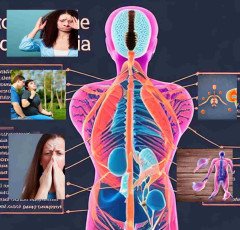
What are Endocrine disorders such as thyroid disease and adrenal disorders ?

The endocrine system, which is in charge of generating and controlling hormones in the body, is afflicted by endocrine disorders.
Hormones are chemical messengers that regulate a variety of bodily processes, such as metabolism, sexual function, growth and development, and mood.
An endocrine ailment known as thyroid disease affects the thyroid gland, a tiny gland with a butterfly-like form that is situated in the neck.
The thyroid gland creates hormones that control the metabolism of the body. There are a number of symptoms that can occur when the thyroid gland produces too much or too little hormone, including changes in body temperature and heart rate, weight gain or loss, weariness, and hair loss.
Diseases of the adrenal glands, which are found on top of the kidneys, are referred to as adrenal diseases.
The hormones cortisol, which aids in the body's reaction to stress, and aldosterone, which aids in blood pressure regulation, are produced by the adrenal glands. Depending on which hormones are damaged, various symptoms can be brought on by an adrenal dysfunction.
For instance, an adrenal gland that is overactive can result in high blood pressure, weight gain, and muscle weakness, whereas an adrenal gland that is underactive might result in exhaustion, low blood pressure, and weight reduction.
Blood tests, imaging scans, and other diagnostic procedures are frequently used to identify thyroid illness and adrenal abnormalities.
Depending on the particular illness and how severe it is, treatment options can include medication, surgery, or hormone replacement therapy.
To correctly identify and treat any endocrine issues, it's crucial to engage with a healthcare practitioner.
The following are some frequent forms of thyroid disease:
Hypothyroidism:
This condition develops when the thyroid gland doesn't produce enough hormone. Fatigue, weight gain, dry skin, hair loss, and depression are some of symptoms.
Hyperthyroidism:
When the thyroid gland produces too much hormone, it is said to have hyperthyroidism. Weight loss, an accelerated heartbeat, jitters, and heat intolerance are possible symptoms.
Goiter:
When the thyroid gland is either overactive or underactive, it can enlarge up and cause a goiter. A bump in the neck caused by a goiter may be noticeable.
Thyroid cancer:
A rare type of cancer that affects the thyroid gland is thyroid cancer. It could result in hoarseness, a lump in the neck, or trouble swallowing. Adrenal problems can also manifest in a variety of ways, such as:
Addison's disease:
In the uncommon disorder known as Addison's disease, the adrenal glands fail to produce enough hormones. Fatigue, muscle weakness, weight loss, and low blood pressure are just a few symptoms.
Cushing's syndrome:
In Cushing's syndrome, the adrenal glands overproduce the stress hormone cortisol. Weight gain, a rounding of the face, thinning of the skin, and high blood pressure are only a few symptoms.
Adrenal tumors:
Tumors that develop in the adrenal glands are referred to as adrenal tumors. Either benign (non-cancerous) or malignant (cancerous), they can exist. Depending on the type of tumor and whether it is generating hormones, the symptoms can change.
The management of symptoms with alternative medicines or surgery to remove tumors may be used as treatment for adrenal diseases. Based on a patient's unique condition and medical history, a healthcare practitioner can assist in deciding the best course of action for their care.
There are numerous more endocrine problems that can impact the body in addition to the types of thyroid illness and adrenal disorders discussed above. Several instances include:
Diabetes:
Is a disease in which the body struggles to control blood sugar levels. Numerous things, including autoimmune illnesses, lifestyle choices, and genetics, can contribute to its occurrence.
Polycystic ovary syndrome (PCOS):
The hormonal condition known as polycystic ovarian syndrome (PCOS) affects women. Numerous symptoms, such as irregular menstrual cycles, acne, weight gain, and excess growth.
Growth hormone deficiency:
Insufficient production of the hormone growth hormone, which is crucial for growth and development, results in growth hormone insufficiency. It can result in a variety of symptoms in adults as well as stunted growth in children.
Pituitary tumors:
The pituitary gland, which is found near the base of the brain, can develop these growths. A variety of symptoms connected to hormone production and brain function can be caused by a tumor, depending on its size and location.
An endocrinologist, a physician who focuses on identifying and treating hormonal diseases, may be necessary for the complex diagnosis and treatment of endocrine illnesses. To help manage symptoms and avoid problems, lifestyle modifications including diet and exercise may also be suggested in addition to medication and surgery.
The general health and wellbeing of an individual may be significantly impacted by endocrine problems. They can cause a number of issues, including heart disease, osteoporosis, and infertility, if they are not treated. If you are exhibiting signs of an endocrine issue, such as unexpected weight changes, exhaustion, or adjustments to your mood or sexual function, you should consult a doctor right once.
There are a number of actions you may take to promote your general health and well-being in addition to working with a healthcare provider to manage an endocrine disease, such as: -
You can assist your body's innate capacity to control hormones and keep balance throughout your life by adopting a holistic approach to your health and wellbeing.
Working closely with your medical team is essential if you have been diagnosed with an endocrine problem in order to effectively manage your condition. This may entail routine hormone level testing, alterations to your prescription or treatment regimen, and lifestyle changes to promote your general health.
When a tumor or hormonal imbalance needs to be removed, surgery may be advised. The risks and advantages of any surgical operation should be discussed with your healthcare professional, and all pre- and post-operative instructions should be carefully followed.
Although managing an endocrine problem and maintaining your quality of life might be difficult, there are numerous services accessible to you. For those with endocrine problems, support groups, internet discussion boards, and patient advocacy groups can offer knowledge, education, and a sense of community.
Always be an advocate for your own health and be open and honest in your communication with your healthcare staff about any worries or queries you may have. Endocrine diseases can be successfully managed with the correct care and assistance, allowing one to lead a full and healthy life.
To monitor your status and avoid complications
To maintain frequent check-ups and screenings. Based on your particular requirements, your healthcare practitioner can suggest a suitable timetable for follow-up visits and tests.
It's crucial to speak with your healthcare practitioner if you are exhibiting signs of an endocrine disorder or are worried about your hormone levels or general health. They can conduct a physical examination, request imaging or blood tests, and, if necessary, recommend you to an endocrinologist or other specialist.
Overall, better results and improved quality of life can result from early detection and treatment of endocrine diseases. People with endocrine diseases can continue to have active, healthy lives with the right management and support.
Noting that some endocrine diseases may be hereditary or run in families is also crucial. It's a good idea to talk to your healthcare practitioner if you have a family history of an endocrine illness and to explore genetic testing or counseling to better understand your risk.
Endocrine problems may also be facilitated by some drugs or medical conditions that alter hormone levels. In order to make sure that your treatment plan is effective and that your general health is being kept an eye on, it's crucial to address any medications or medical issues with your healthcare professional.
When dealing with an endocrine disease, self-care and stress reduction should come first.
Hormone levels can be impacted by long-term stress, which can also make many endocrine disorders' symptoms worse. Finding good coping mechanisms for stress, like exercising, practicing mindfulness, or speaking with a therapist, can be crucial to controlling your illness and promoting your general health and wellbeing.
Endocrine disorders are a set of illnesses that can affect the body's ability to produce and regulate hormones. Endocrine problem sufferers can live healthy, productive lives with the right diagnosis, care, and management. It's vital to speak with your healthcare professional to decide the best course of action if you have symptoms or concerns about your hormone levels or general health.
Absolutely! It's crucial to take any health problems seriously and to get medical help when necessary. Working together with your medical team can help you manage your illness efficiently while giving self-care and stress reduction first priority. Endocrine abnormalities can have a substantial influence on your health and well-being.
It's crucial to speak openly and honestly with your healthcare provider about any symptoms or concerns you may have as well as to be an advocate for your own health. You may make educated decisions about your health by keeping a log of your symptoms, monitoring your medication or treatment, and staying up to date on the most recent research and therapies.
In order to determine the optimal course of treatment for your particular requirements, your healthcare team may use some trial and error when managing an endocrine illness. In order to get the treatment and assistance you require to keep your health and well-being, you must be patient and persistent.
That is correct! Every person's experience with an endocrine illness is different, and every person's needs and the condition's specific treatment options will influence how the disorder is diagnosed, treated, and managed.
Endocrine diseases can take a variety of forms, including:
These are just a few instances of the numerous endocrine disorders that can affect the body's ability to produce and regulate hormones. It's crucial to consult your healthcare provider if you are having symptoms or are worried about your hormone levels or general health in order to decide on the best course of action.























































































 Only For The United States
Only For The United States  NordPass
NordPass  One World Collection
One World Collection  Amazon Best Selling Products
Amazon Best Selling Products  BEST SELLER TOP10
BEST SELLER TOP10  Sennheiser
Sennheiser  Best Selling Books
Best Selling Books  Hello Theme
Hello Theme  Men Clothing
Men Clothing  ASPINAL LONDON
ASPINAL LONDON  Online Marketing
Online Marketing  ELECTRONIC ACCESSORIES
ELECTRONIC ACCESSORIES  The Secret Email System
The Secret Email System  Best Home Appliances
Best Home Appliances  SEO Checklist
SEO Checklist  Unreal Engine 5 For Beginners Learn The Basics Of Virtual Production
Unreal Engine 5 For Beginners Learn The Basics Of Virtual Production  Favorite Company (Cuelinks)
Favorite Company (Cuelinks)  ASUS Laptop
ASUS Laptop  The Click Engine
The Click Engine  Creative Brief For Video Shoot
Creative Brief For Video Shoot  Smart Doorbell
Smart Doorbell  TitTok Revolution
TitTok Revolution  Artificial Intelligence
Artificial Intelligence  Women Fashion
Women Fashion  RPM 3.0
RPM 3.0  Hot Bags For Pain Relief
Hot Bags For Pain Relief  NordVPN
NordVPN  Acer Laptop
Acer Laptop  NordLocker
NordLocker  1150+Trendy kids coloring pages Bundle
1150+Trendy kids coloring pages Bundle  Online Technology Classes
Online Technology Classes  SOFAS
SOFAS  Graphics & Design
Graphics & Design  All Wireless Products
All Wireless Products  Top Rated From Amazon
Top Rated From Amazon  Best Sellers On Amazon
Best Sellers On Amazon  Best Robotic Vacuum Cleaners
Best Robotic Vacuum Cleaners  Unlimited access to classes on illustration, photography, design, film, music
Unlimited access to classes on illustration, photography, design, film, music 
















